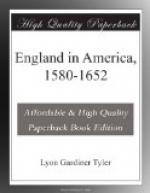August 3, 1637, Vane sailed for England, and thenceforward the Hutchinson faction, abandoned by their great leader, made little resistance. In the latter part of the same month (August 30) a great synod of the ministers was held at Newtown, which was the first thing of the sort attempted in America, and included all the teaching elders of the colony and some new-comers from England. This body set to work to lay hold of the heresies which infected the atmosphere of the colony, and formulated about “eighty opinions,” some “blasphemous,” but others merely “erroneous and unsafe.” How many of them were really entertained by Mrs. Hutchinson’s followers and how many were merely inferences drawn from their teachings by their opponents it is hard to say.
When these heresies were all enumerated and compared with the opinions of Cotton and Wheelwright, only five points of possible heterodoxy on their part appeared. Over these there was a solemn wrangle for days, till Cotton, shrinking from his position, contrived, through abundant use of doubtfull expressions, to effect his reconciliation with the dominant party. After a session of twenty-four days the synod adjourned, and Wheelwright, alone of the ministers, was left as the scapegoat of the Antinomians, and with him the majority determined to make short work.[14]
At the general court which met November 2, 1637, the transgressions of Wheelwright through his fast-day sermon were made the basis of operations. For this offence Wheelwright had been judged guilty more than nine months before, but sentence had been deferred; he was now sentenced to disfranchisement and banishment. Many of his friends at Boston, including William Aspinwall and John Coggeshall, delegates to the general court, experienced similar treatment for signing the petition presented to the court in March, 1637, after the verdict against Wheelwright.[15]
An order was passed for disarming Mrs. Hutchinson’s followers, and finally the arch-heretic herself was sent for and her examination lasted two days. In the dialogue with Winthrop which began the proceedings, Mrs. Hutchinson had decidedly the best of the controversy; and Winthrop himself confesses that “she knew when to speak and when to hold her tongue.” The evidence failed wretchedly upon the main charge, which was that Mrs. Hutchinson alleged that all the ministers in Massachusetts except Mr. Cotton preached “a covenant of works.” On the contrary, by her own evidence and that of Mr. Cotton and Mr. Leverett, it appeared that Mrs. Hutchinson had said that “they did not preach a covenant of grace as clearly as Mr. Cotton did,” which was probably very true.[16]




